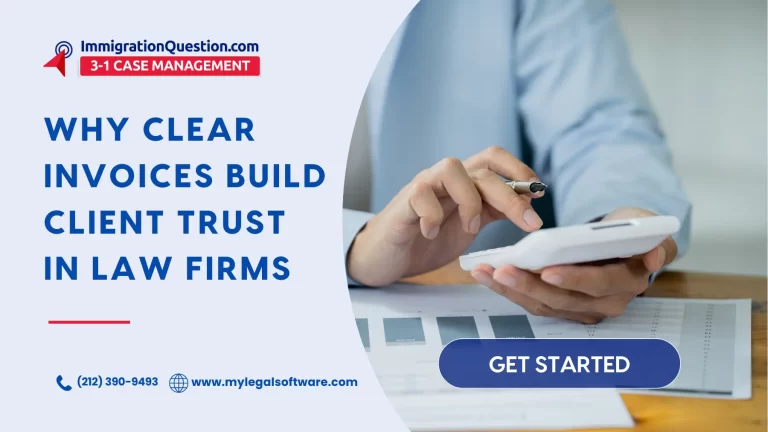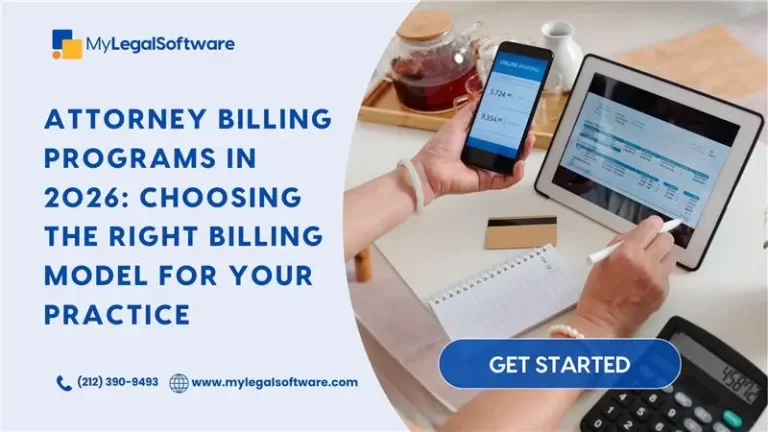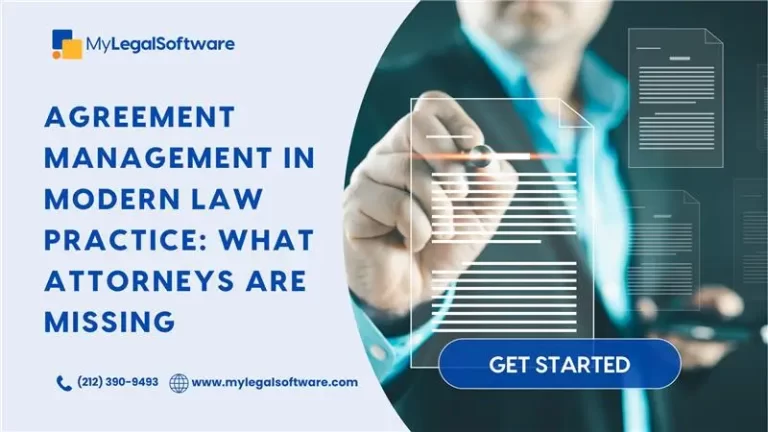In today’s competitive online world, it’s no longer enough for law firms to rely on word of mouth or traditional ads. Digital visibility is key, and one of the most powerful ways to build that presence on the internet is through link building.
Link building is simply the practice of getting other websites to link to yours. These backlinks are like digital endorsements, telling search engines that your content is trustworthy and authoritative.
In this blog, we’ll walk you through proven, ethical tactics that can help your law firm earn meaningful links, rise in search rankings, and attract more of the right clients.
Why Link Building Matters for Law Firms
1. It Boosts Your Rankings on Google
Backlinks act like votes of confidence. When reputable sites link to yours, Google sees your content as more trustworthy, especially around high-value legal keywords. That trust leads to better placement in search results, right where your prospects are looking.
2. It Puts You in Front of People Actively Looking for Legal Services
A smart link-building strategy for lawyers expands your digital reach. When your firm is listed in legal directories or featured on credible sites, you don’t just show up in search; you show up in the right places where clients are already searching for help.
3. It Builds Your Reputation in the Legal Community
Being linked by respected organizations, like bar associations or legal publications, sends a strong signal about your expertise. These kinds of endorsements influence both your peers and clients.
4. It Drives High-Quality Referral Traffic
Beyond rankings, backlinks also bring real visitors to your site: people who are already reading about topics you cover and who are likely to engage with your services. It’s often warmer traffic than what comes straight from Google.
What Makes a Backlink Valuable?
Here’s what separates a powerful link from an average one:
Authoritative Source
A link from a well-known site like your state bar association carries more weight than one from a random blog.
Relevance to Your Practice or Location
A backlink from a website related to your practice area or location will usually carry more SEO weight. If you’re a criminal defense lawyer in Florida, a backlink from a Florida legal aid group is more meaningful than one from a national tech blog, even if it’s more popular.
Natural Anchor Text
The clickable part of the link (like your firm name or practice area) should feel natural within the sentence, not forced or over-optimized. Good backlinks don’t always scream SEO.
Quality of the Page It’s On
If your backlink is fixed within a well-written, informative page, it’s worth more to search engines and readers.
What are Some Link-Building Strategies for Lawyers
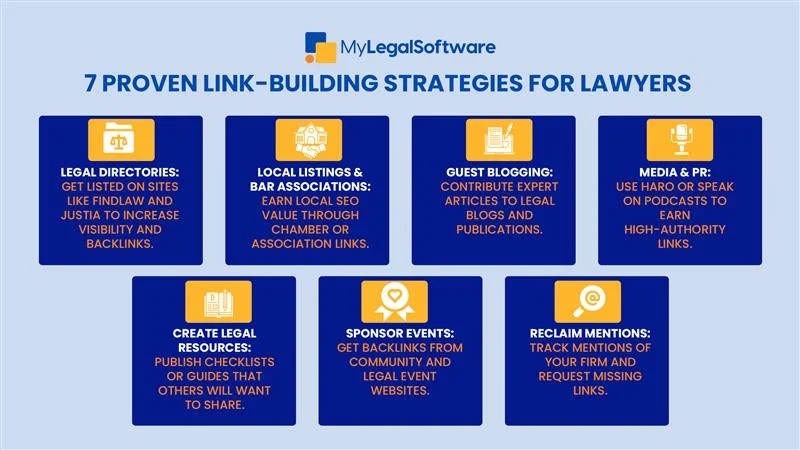
1. Get Listed in Legal Directories
Submitting your firm to trusted directories like FindLaw is a great place to start. These sites often rank well on Google, which means your profile can also rank well. Plus, clients use them to find legal help directly. Just make sure your business info (name, address, phone number) is consistent across the board to boost your local SEO.
2. Connect With Local Business and Bar Association Sites
Your local chamber of commerce, city website, or bar association might offer listings, event features, or press coverage that link back to your firm. These links are often overlooked but can carry strong local SEO value and show your community ties.
3. Write for Legal Blogs and Publications
Guest blogging is a great way to show off your expertise and earn high-quality backlinks at the same time. Focus on topics relevant to your practice, what’s trending, what’s changing, what clients should know. These posts build authority and give you natural opportunities to link back to your site.
4. Build Thought Leadership Through Media and PR
Journalists need expert legal voices. Services like Help a Reporter Out (HARO) connect you with media outlets looking for commentary. Your contributions often result in mentions (and links) from high-authority publications. You can also build backlinks by speaking on legal podcasts or panels and being featured in show notes or event pages.
5. Create Useful Legal Resources
Create downloadable guides, how-to checklists, or comprehensive FAQs that other legal professionals or websites would find useful. When you create genuinely helpful resources, people naturally link to them in their own content.
6. Sponsor Community and Legal Events
Sponsoring a local event, legal seminar, or charity initiative often comes with a backlink from the event’s website. These links not only help SEO but also show your firm is active and invested in the community. It’s a win-win that can lead to more opportunities over time.
7. Reclaim Unlinked Mentions
Sometimes, your firm gets mentioned online but without a link. That’s a missed opportunity. Use tools like Google Alerts to find these mentions, then reach out kindly and ask if they’d consider linking to your site. It’s usually a quick fix and an easy win.
Ethical Considerations in Legal Link Building
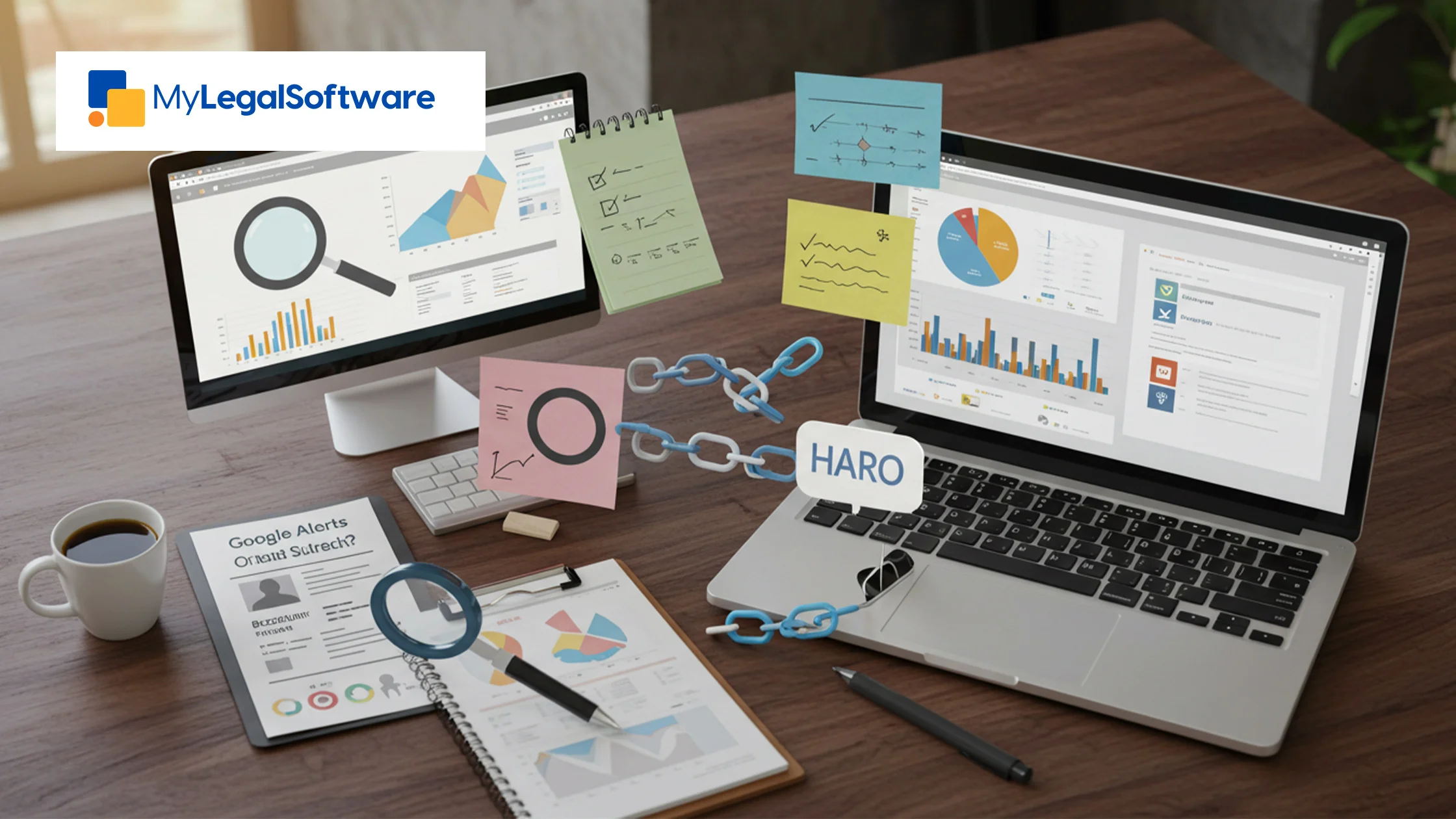
Don’t Buy Links or Join Link Schemes
Buying backlinks or engaging in shady link exchanges is risky. Google algorithm is smart, and penalties can tank your rankings. More importantly, these practices might violate advertising rules for lawyers in your jurisdiction.
Stick with strategies that earn links by providing real value. It’s better for SEO and for your professional reputation.
Comply With Your State Bar’s Advertising Rules
Legal marketing rules vary by state, especially when it comes to how you promote your firm online. Make sure your link-building strategies comply with your local bar’s advertising requirements, including any disclaimers or restrictions.
Prioritize Editorial Links Over Promotional Manipulation
At the end of the day, the best link-building strategy for lawyers is offering genuine value. When your content solves real problems or answers real questions, backlinks come more naturally, and more ethically.
Helpful Tools for Link Building
The right tools can save time and help you stay organized while building high-quality backlinks. Here are some of the most effective platforms for tracking, analyzing, and managing your law firm’s link-building strategy:
- Ahrefs, SEMrush, and Moz: These SEO tools allow you to analyze your backlink profile, monitor competitors’ links, and discover new link-building opportunities. They also flag lost links and provide domain authority scores to help you prioritize outreach targets.
- Google Alerts: Set alerts for your firm name, attorneys, and key practice terms to catch brand mentions without links. When a site mentions you but doesn’t link back, you can reach out and request attribution.
- HARO (Help a Reporter Out): A platform that connects legal professionals with journalists. Providing quotes or insights can earn you backlinks from high-authority news outlets and build your public profile.
- BuzzSumo: Use this to find top-performing content in your niche and identify influencers or websites that frequently link to legal content. Great for planning content and targeting outreach.
- Screaming Frog: A powerful website crawler that audits your internal link structure. This helps ensure link equity flows effectively throughout your site and flags technical SEO issues that could impact visibility.
Final Thoughts
There’s no shortcut to building authority online. Effective link-building strategies for lawyers take time, consistency, and a focus on quality over quantity. But if you stay the course and offer real value, the results will follow.
Avoid shortcuts. Instead, invest in relationships, share useful content, and align your efforts with the ethical and professional standards your firm stands for.
And when those links start generating leads, you need the right legal case management systems in place. MyLegalSoftware helps you manage client intake, cases, and even lead generation in one place. So, when your SEO pays off, you’re ready to deliver.
Frequently Asked Questions
1. What are some link-building strategies for lawyers?
Legal directory listings, guest blogging, sponsorships, local business listings, media contributions, digital PR outreach, and reclaiming brand mentions are all effective link-building strategies for lawyers.
2. How do I know if a backlink is high-quality?
Look for links from authoritative, relevant websites with strong reputations. The best links use natural anchor text and appear within useful, original content.
3. Can I build links without writing blog content?
Yes. Directories, speaking engagements, sponsorships, media quotes, and downloadable resources all offer non-blog options for link building.
4. Can podcasts and webinars build quality backlinks?
Absolutely. Guest appearances often result in backlinks through bios, event listings, or show notes.


